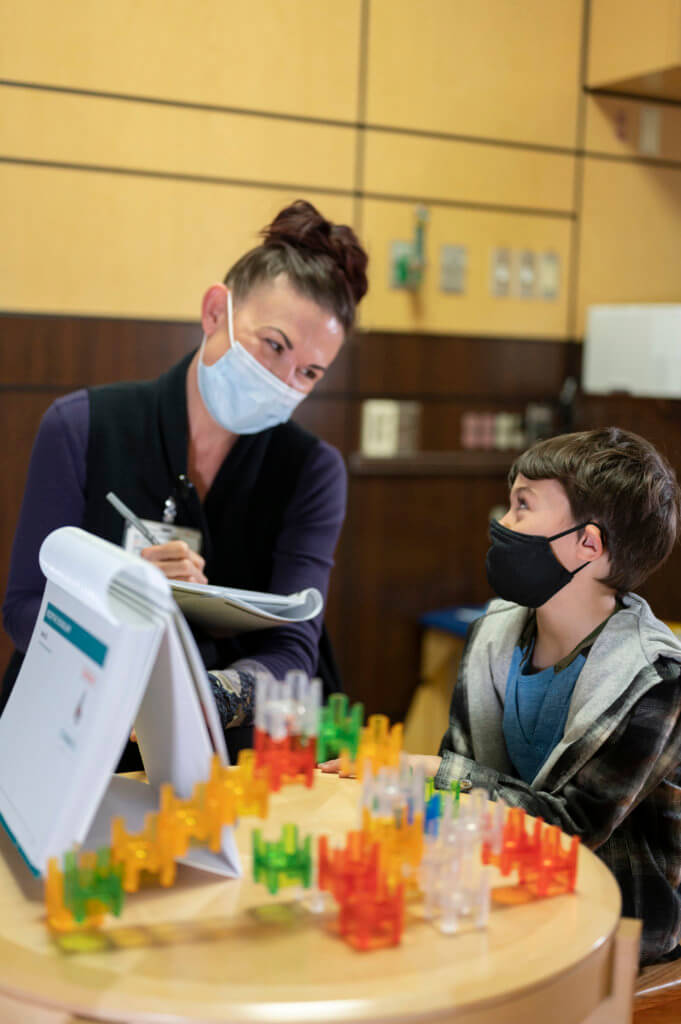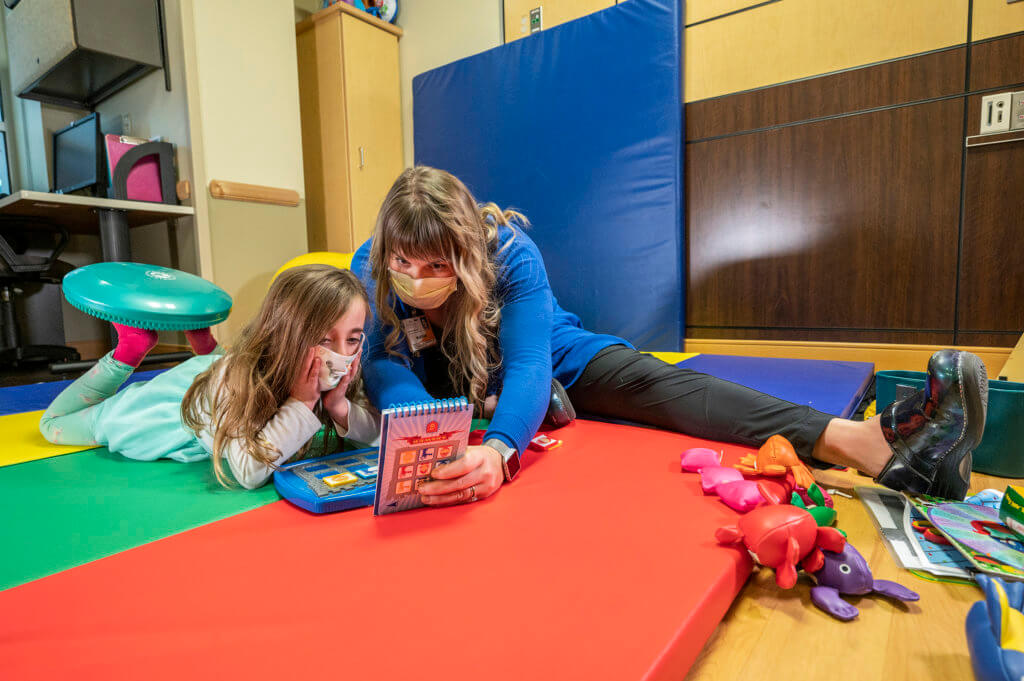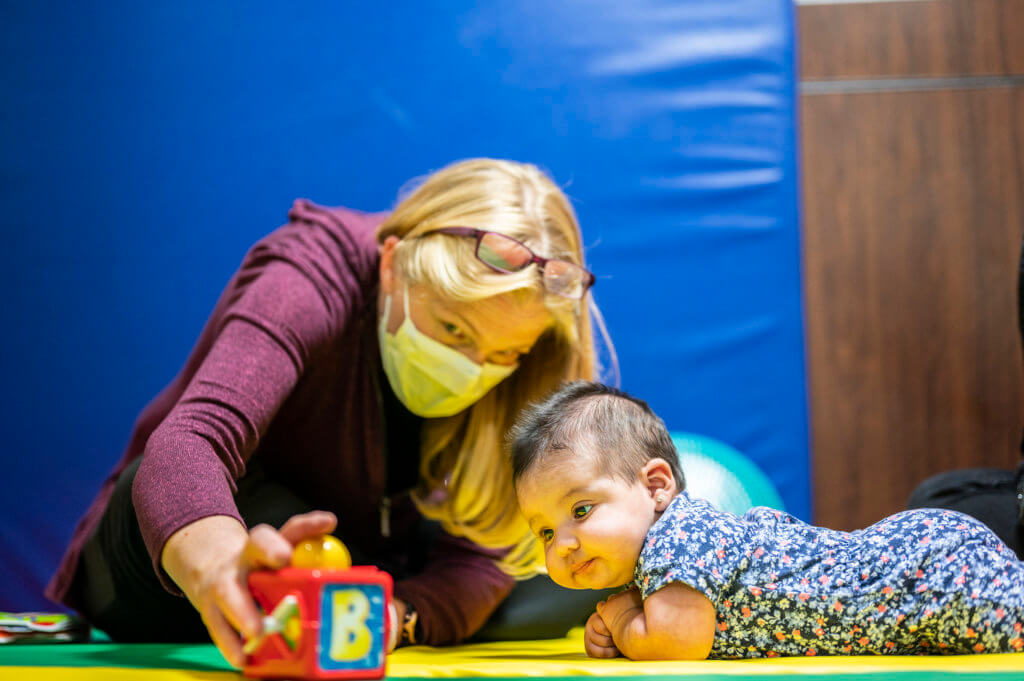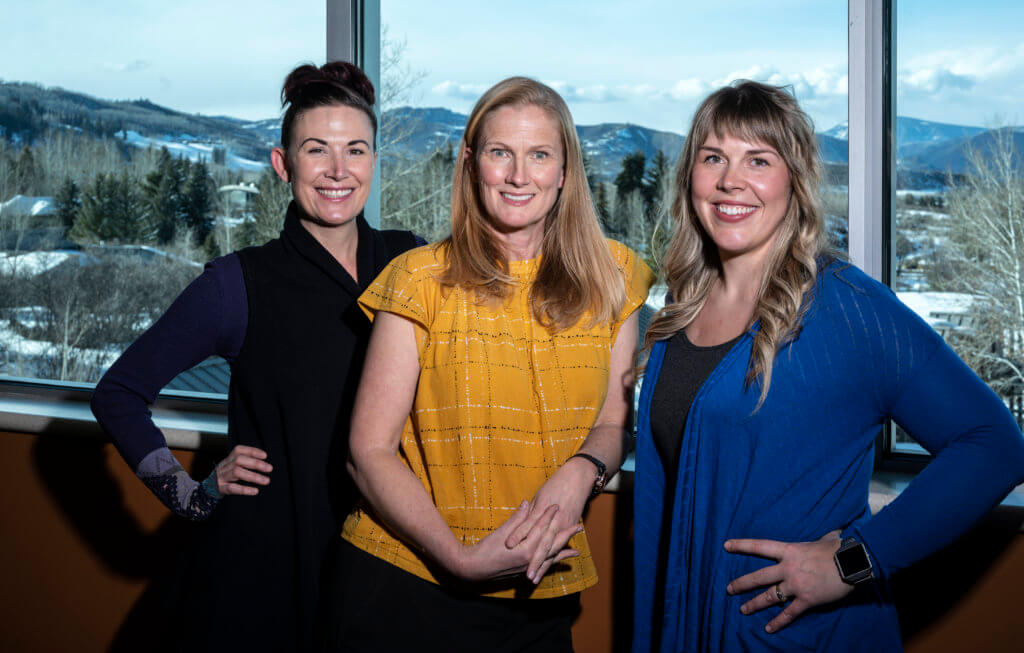Recently a local boy was diagnosed with ADHD (attention deficit hyperactivity disorder). Teachers were concerned that because he couldn’t sit still for an extended period of time and had a limited attention span, the child was experiencing setbacks in his education and his peer-to-peer interactions.
Eventually, the parents were referred to Lizzy Ransbottom, MA BCC/SLP, CBIS, speech-language pathologist at Aspen Valley Hospital. After an initial assessment of the child, Ransbottom consulted her two AVH rehabilitation therapist colleagues with expertise in pediatric care: occupational therapist Marissa Meinema, MS, CBIS, OTR/L, and physical therapist Juliette Coughlin, PT, DPT.
Together, the three of them reached a determination that has made a life-changing difference for the child — they found that many of his academic challenges were rooted in difficulties with visual scanning and focusing in distracting environments. With an increased awareness of their child’s strengths and needs, Ransbottom worked with the child’s parents and teachers to create a classroom setting suited to the boy’s unique educational needs.
“He needed support in the classroom, so we adjusted his learning environment,” Ransbottom said. “For example, he received preferential seating upon our request, and the teacher now asks him to repeat instructions to ensure that he understands assignments. We set him up for success.”
Today, the boy is thriving in his studies and he was even named Student of the Week at his school.
“Instead of considering the situation from only one therapeutic point of view, we took a holistic approach and looked at all the factors that might be playing a role,” Meinema said. “In that way, we were able to identify specific areas where we could help the child increase his overall cognition, be more present in his peer relationships, and improve his attention and awareness skills. By adapting his environment, we were able to make him more successful.”
Pediatric therapists treat a wide variety of specialized needs including developmental gross and fine motor delays, sensory processing challenges, cognition and attention issues, movement disorders and more.

MORE THAN ORTHOPAEDIC CARE
The boy’s story is a perfect antidote to one of the central misconceptions about pediatric rehabilitative therapy: that it’s only about helping children recover from stuttering in the classroom, poor handwriting skills or fractured bones on the ski slope.
While AVH’s rehab therapists do treat those types of conditions, their services encompass a galaxy of other highly specialized pediatric needs. These include treatment of developmental gross and fine motor delays, sensory processing challenges, cognition and attention issues, as well as movement disorders such as cerebral palsy, other congenital conditions and more.
“Many people think that I work only on issues related to talking,” Ransbottom said. “Actually, I work with all areas involved in speaking and language, including voice, feeding/swallowing, reading/writing, social skills — and the list goes on.”
While Coughlin enjoys assisting school-aged athletes back to sports, she stated, “Helping a child with significant challenges to complete a task others take for granted is the best feeling.” A current patient needed a gait trainer so he could work on standing and walking to strengthen his legs after being carried everywhere for almost a year. “When that mom told me her son stood up to give her a hug after not standing independently for almost a year, I almost cried. That is special,” said Coughlin.
EARLIER = BETTER
As with virtually any medical issue, the earlier a condition is identified and treated, the better the outcomes. Pediatric rehabilitation is more effective when started at the earliest possible age. At AVH, speech-language therapy typically doesn’t begin until about 10 months of age, but physical and occupational therapy may start as early as newborn.
As with virtually any medical issue, the earlier a condition is identified and treated, the better the outcomes. Pediatric rehabilitation is more effective when started at the earliest possible age.

“We know the biggest period of brain development is in the first three years of life,” Coughlin said. “So, when you want to have the most benefit of that neuroplasticity, those years are absolutely key. For the best outcomes, we need to start treating the child sooner rather than taking a wait-and-see approach.”
THREE DISCIPLINES, ONE LOCATION
The story of the couple with the young son shines a light on one of the great strengths of the AVH pediatric rehabilitation program: the collaborative approach that Coughlin, Meinema and Ransbottom take for each of their patients.
“At AVH we provide one-to-one therapy sessions with each and every patient,” Meinema said. “Here, we have access to all three disciplines, and we consult with each other all the time. That’s a big benefit for our patients and their families.”
To cite another real-world example, Ransbottom may consult with her colleagues about a child who has been labeled a “picky or problem eater.”
“In a case like that, Juliette and Marissa are very helpful with issues related to sensory challenges or postural stability,” Ransbottom said.
From a practical standpoint, the AVH model can save parents from having to shuttle a child from appointment to appointment, with no guarantee the various therapists will work together to develop a comprehensive plan.
“Here at AVH, the three of us work collaboratively,” Meinema said. “You can come to one location, know the therapists are communicating with each other, and get a well-rounded approach to addressing the child’s issues. For a parent with a busy life, that can make a big difference.”
Another important way the three AVH therapists stand out is that Meinema and Ransbottom are Certified Brain Injury Specialists (CBIS), and Coughlin is working towards her Pediatric Certified Specialist and CBIS. Soon, they will make up the only comprehensive pediatric brain injury therapy team in the Roaring Fork Valley.

SPECIAL CHALLENGES, SPECIAL REWARDS
As with other healthcare services, AVH pediatric therapies were adversely affected by the COVID-19 pandemic. Many young patients have compromised immune systems or multiple health conditions, increasing their risk of serious complications from viral infections.
The three AVH pediatric therapists adapted with a quick shift to telemedicine for many of their pediatric (as well as their adult) patients. Just as important was the way parents embraced the move to virtual visits.
“Pediatric therapy is all about teamwork — between the child and the therapist, the therapist and the family and the family and the child,” Coughlin said. “One hour of therapy may help children reach their goals eventually, but the child really needs carryover into the home, the school and the community. Everyone has to be on the same page, and providing the family with a realistic home program is hands down the most important thing for this kind of therapy.”
While working with children has unique challenges, it also has special rewards. “I have a passion to work with children and families to promote functional independence,” Meinema said. “It’s very rewarding to watch a child develop life skills and thrive both physically and emotionally.”
DOES YOUR CHILD NEED HELP?
To learn more about AVH’s comprehensive pediatric rehabilitative services, call 970.544.1177, or please click here.
At AVH, all three pediatric therapists work collaboratively to develop a comprehensive plan that addresses the child’s issue.


